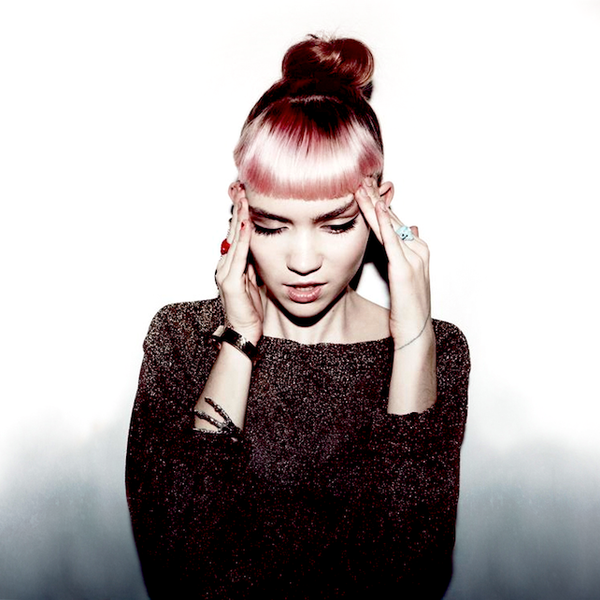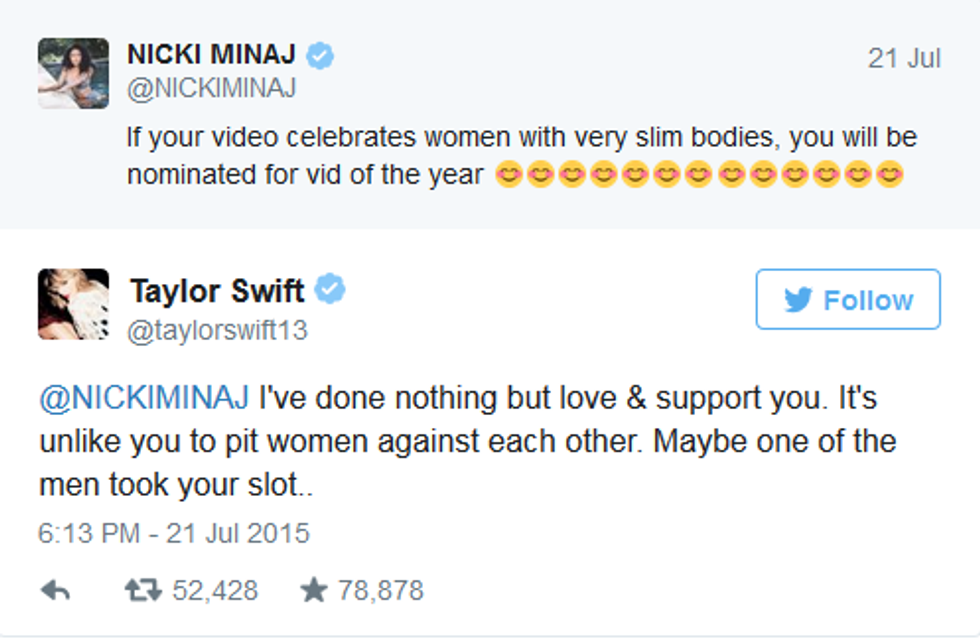If you’re one of Nicki Minaj’s nearly 20 million Twitter followers, or one of Taylor Swift’s nearly 61 million, or even a casual social media user, you’ve probably witnessed the uproar over Minaj’s response to the VMA Nominations.
via TwitterMinaj’s 2014 controversial single “Anaconda” stirred up audiences around the world with its subsequent video, which included copious amounts of butts and twerking. Maybe not everyone’s cup of tea, but the song also fostered a revolution of women accepting their bodies and sexuality.
Although the two “made up” after Swift tweeted to Minaj that she “misunderstood” the tweets, Minaj still has an important argument bigger than Taylor Swift or the VMAs; it’s time we started listening, too.
Having broken VEVO’s 24-hour view record with 19.6 million views (only to be passed by Swift’s “Bad Blood” nearly a year later), as well as spending eight weeks on the Billboard Hot 100 Charts, “Anaconda” has had just as much success as the other videos nominated for Video of the Year.
What Minaj is trying to tell us: this isn’t about calling out Swift or the other nominated artists. It’s about not receiving the appropriate recognition for her work simply because she doesn’t embody traditional European beauty standards. Britney Spears appeared nearly nude in her music video for “Toxic” which received a Video of the Year nomination in 2004. Robin Thicke received the nomination for “Blurred Lines” in 2013, which included naked women and lyrics that question if Thicke knows the definition of consent. Miley Cyrus won VOTY in 2014 for appearing naked in “Wrecking Ball.”
But, consequently, being a black woman and sexualizing yourself in a music video gets pushed aside to the “Female” and “Hip Hop” categories, and is no longer viewed for its cultural impact or artistic quality. There are infinite examples of this problem affecting other black artists; a recent and notable example is when Beyonce received criticism for not writing her own music when she lost Album of the Year to Beck at the Grammys. Not to mention, there’s an issue with white artists adopting black culture into their own lives, but not speaking out against black issues.
MTV and those in defense of Swift don’t understand the cultural impact Minaj has outside of “Anaconda.” We could go on for years debating interpretations of the lyrics, but the song makes a stance on the problem of fetishization black women (as well plus-sized women). However, backlash sparked over the line “f*ck a skinny b*tch in the club,” which is often interpreted as body shaming. Naturally, our society would take a song like "Anaconda" and hold it to a different standard as the lyrics are ambiguous; black women in the music industry often are held to a higher standard than artists such as Taylor Swift, who is praised for her work and feminist soapbox. Yet, outside that particular song, Nicki has spoken out on numerous occasions regarding racism, sexism, and education on her Twitter.
Swift, of course, is successful and has made an impact on the music industry's misogynistic angles. However, Minaj said it to Swift herself: “You should speak on this,” meaning, Swift ignores the racial side of feminism. Swift replied, telling Minaj to come up on stage if she won, rather than speaking out on the issue. Of course, she’s not facing oppression in the same way as Minaj. But, if she continues to project this “feminist” image, it’s vital that she discuss issues outside herself. Sorry, Tay, but band-aids don’t fix the inherent racial problems in the music industry.
The “Swift versus Minaj” Twitter debate may be old news, but racial issues in both the music industry and in feminism have still yet to be solved. Minaj made the choice to speak out about it. This isn’t a “pitting women against each other” argument. Swift and Minaj were incredibly classy about it.
Yet, it's time we start listening, learning, and applying what Minaj is saying to us.






















